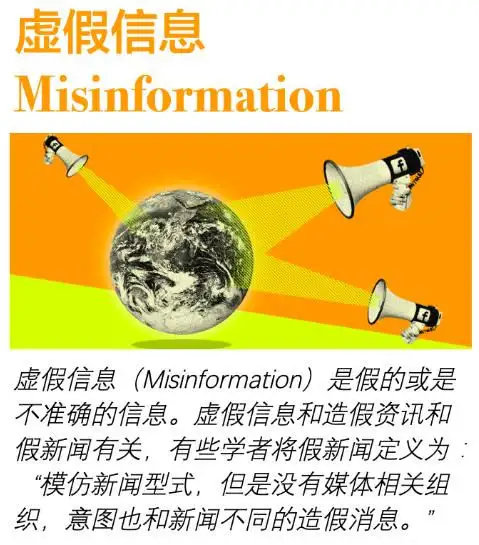谣言和虚假信息有什么区别?

「释义」
虚假信息(Misinformation)是假的或是不准确的信息。例子包括不实的谣言、侮辱和恶作剧,更刻意的造假资讯包括像是恶作剧、钓鱼式攻击及宣传等不实内容。新闻模仿或是讽刺新闻若被粗心大意的人信以为真,并且加以传播,也是虚假信息。虚假信息和造假资讯和假新闻有关,有些学者将假新闻定义为:“模仿新闻型式,但是没有媒体相关组织,意图也和新闻不同的造假消息。”。
虚假信息的范围比造假资讯(Disinformation)要广,虚假信息虽有误或不准确,但散播者不一定有意要误导大众,而造假资讯是刻意误导大众的资讯。
「应用场景」
虚假信息之所以成为难解问题,部分原因在于,造成虚假信息形成并散播的许多方法原本也有很多正当用途。2016年美国总统大选时,剑桥分析公司用来收集个人信息的先进技术,几乎与公司寻找新客户、非政府组织寻找新支持者、新闻媒体吸引新受众的技术完全相同。商业方面,谷歌AdSense等在线代理商提供的广告覆盖范围惊人,但其中可能包含有问题的网页。广告技术初创公司Storyzy发现,网页广告中有600多个品牌推送阴谋论及其他虚假信息。WhatsApp和微信等封闭式通信应用让家人朋友能够轻松保持联系,但也导致谣言迅速散播,很难彻底辟谣。
Part of what makes misinformation a wicked problem is that many of the tools and methods for creating and distributing it are also widely used for non-nefarious purposes. The sophisticated techniques for collecting personal data used by the Russians and Cambridge Analytica in the lead-up to the 2016 U.S. presidential election are nearly identical to those used by companies trying to reach newcustomers, NGOs seeking new supporters, and news outlets attempting to attract new audiences. For businesses, advertising through online agencies such as Google’s AdSense offers incredible reach, but that reach can include questionable sites. Ad-tech startup Storyzy has found more than 600 brands advertising on sites that promote conspiracy theories and other misinformation. Closed-messaging apps such as WhatsApp and WeChat help family and friends conveniently stay in touch, but they also make quick work of spreading dangerousrumors and lies that are difficult to debunk.
这些活动都让公司陷入不利境地。即使普通公司与俄罗斯的钓鱼公司毫无共通点,防止Facebook及其他平台上出现虚假情报的措施也会限制合法企业在社交平台上开展外联。谷歌永久禁止了近200个有争议内容发布者订阅AdSense,也就是限制了商家广告可触及的范围。封闭式通信应用则让商家难以获知自己的品牌在何时以何种方式被攻击和滥用,例如2017年肯尼亚总统大选前期,有人盗用BBC的商标和图片在WhatsApp上行骗,最后BBC不得不发布视频辟谣。
All of this activity renders companies vulnerable. Even though a U.S. firm may have nothing in common with a Russian troll factory, efforts to secure Facebook and other platforms from disinformation campaigns limit how legitimate businesses can conduct outreach on social platforms. Google has permanently banned nearly 200 publishers of problematic content from subscribing to AdSense, thereby limiting companies’ advertising reach. And closed-messaging apps make it difficult to know when, or whether, your brand is being attacked and misused, as the BBC learned in the run-up to the 2017 Kenyan presidential election, when someone created a sophisticated hoax using the BBC’s logo and graphics and then circulated it on WhatsApp. The BBC ultimately had to issue a debunking video stating that it was not behind the false content.
以上文字选自《哈佛商业评论》中文版2018年10月刊《如何对抗虚假信息》
克莱尔·沃德尔(CLAIRE WARDLE)丨文
马冰仑 丨编辑本站所有文章、数据、图片均来自互联网,一切版权均归源网站或源作者所有。
如果侵犯了你的权益请来信告知我们删除。邮箱:dacesmiling@qq.com







